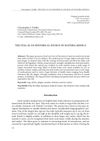 1 citations,
April 2019 in “Acta Medica Philippina”
1 citations,
April 2019 in “Acta Medica Philippina” Azathioprine may help treat severe alopecia areata, but more research is needed.
 1 citations,
August 2018 in “bioRxiv (Cold Spring Harbor Laboratory)”
1 citations,
August 2018 in “bioRxiv (Cold Spring Harbor Laboratory)” A new mutation in the TMEM173 gene and a risk allele in IFIH1 cause a unique set of immune-related symptoms.
 1 citations,
July 2017 in “Pediatric emergency care”
1 citations,
July 2017 in “Pediatric emergency care” Pediatric minoxidil exposures are usually not serious and can often be managed at home.
 1 citations,
July 2016 in “British Journal of Dermatology”
1 citations,
July 2016 in “British Journal of Dermatology” Men with a certain type of hair loss often use facial moisturizers, and a specific antibiotic treatment may help another hair condition.
 1 citations,
August 2013 in “Springer eBooks”
1 citations,
August 2013 in “Springer eBooks” Birth control pills and anti-androgen medications help manage hair growth, acne, and hair loss in women with PCOS.
 1 citations,
February 2009 in “Journal of The American Academy of Dermatology”
1 citations,
February 2009 in “Journal of The American Academy of Dermatology” Children's Serum Sickness-Like Reaction is often linked to antibiotics, especially amoxicillin, and involves symptoms like rash, fever, and joint issues.
 1 citations,
November 1987 in “Journal of The American Academy of Dermatology”
1 citations,
November 1987 in “Journal of The American Academy of Dermatology” Isotretinoin can raise CPK levels, so patients need monitoring, especially before surgery.

New treatments for skin conditions show promise, especially Coacillium® for hair growth in young people with alopecia areata.

Teprotumumab for thyroid eye disease commonly causes fatigue, brittle nails, dry eyes, hair loss, muscle spasms, and dry mouth, with rare serious events like blood clots.
 March 2024 in “Dermatology and therapy”
March 2024 in “Dermatology and therapy” AA patients with comorbid conditions face more severe hair loss and need specific treatments.
 December 2023 in “Research Square (Research Square)”
December 2023 in “Research Square (Research Square)” People with Down syndrome have higher rates of certain immune-related conditions and need special medical attention.
 November 2023 in “International journal of biology, pharmacy and allied sciences”
November 2023 in “International journal of biology, pharmacy and allied sciences” Herbal treatments can help with hair problems, but more research is needed.
 November 2023 in “European medical journal. Dermatology”
November 2023 in “European medical journal. Dermatology” PRP can reduce pain and improve function, but more standardized research is needed.
 September 2023 in “Fides et Ratio”
September 2023 in “Fides et Ratio” The safety and effectiveness of gender-affirming treatments for children are uncertain, with potential long-term risks like infertility.
 September 2023 in “medRxiv (Cold Spring Harbor Laboratory)”
September 2023 in “medRxiv (Cold Spring Harbor Laboratory)” Long-COVID has diverse, long-term health impacts, especially in young people.
 June 2023 in “International journal of biology, pharmacy and allied sciences”
June 2023 in “International journal of biology, pharmacy and allied sciences” New medications are improving depression treatment, emphasizing accurate diagnosis and chronic care.

Older men with late-onset lupus have a higher mortality rate than women.

COVID-19 vaccines had more side effects and worse perception than flu vaccines in Korean lupus patients.
 March 2023 in “Journal of clinical review & case reports”
March 2023 in “Journal of clinical review & case reports” Frontal Fibrosing Alopecia mainly affects postmenopausal Mexican women, requiring early detection to prevent permanent hair loss.
 January 2023 in “International Journal of Research Publication and Reviews”
January 2023 in “International Journal of Research Publication and Reviews” Some herbal ingredients like linalool and tea tree oil have anti-dandruff properties and are safe for use in shampoos.
 January 2023 in “Acta historiae medicinae stomatologiae pharmaciae medicinae veterinariae”
January 2023 in “Acta historiae medicinae stomatologiae pharmaciae medicinae veterinariae” Stag parts were historically used in medicine for various health issues.
 January 2022 in “Open Access Macedonian Journal of Medical Sciences”
January 2022 in “Open Access Macedonian Journal of Medical Sciences” A 5-year-old boy with alopecia totalis had temporary hair regrowth with treatment but relapsed, highlighting the need for thorough investigation and holistic care.

People with Down syndrome have a higher risk of skin disorders and need better screening and treatment.

Researchers found a genetic link for hereditary hair loss but need more analysis to identify the exact gene.
 April 2021 in “BMJ Case Reports”
April 2021 in “BMJ Case Reports” Accurate diagnosis of pseudolymphomatous folliculitis is crucial to avoid mistaking it for more serious conditions.
 March 2021 in “Clin-Alert”
March 2021 in “Clin-Alert” The FDA warned about safety issues with remdesivir and tofacitinib, finasteride is linked to suicidality, potent topical corticosteroids increase osteoporosis risk, henna can cause hemolysis in G6PD deficiency, chemotherapeutic agents can cause adverse reactions, drug interactions are common in cancer patients, ketamine can reduce at-risk drinking, high dose of anticholinergics increases dementia risk in Parkinson's patients, and prenatal exposure to second-generation antipsychotics increases pregnancy complications.
 November 2018 in “Springer eBooks”
November 2018 in “Springer eBooks” Finasteride and minoxidil are effective, low-risk treatments for male hair loss, and patient education on these therapies is important.
 January 2018 in “Elsevier eBooks”
January 2018 in “Elsevier eBooks” The document concludes that alopecia has significant social and psychological effects, leading to a market for hair loss treatments.
 November 2017 in “Research Journal of Health Sciences”
November 2017 in “Research Journal of Health Sciences” Skin infections and eczema were most common in all ages, acne in teens and young adults, and nutritional skin problems and infestations in children.
 March 2017 in “Fundamental & Clinical Pharmacology”
March 2017 in “Fundamental & Clinical Pharmacology” The model and estimator can predict drug exposure in kidney transplant patients well.






























